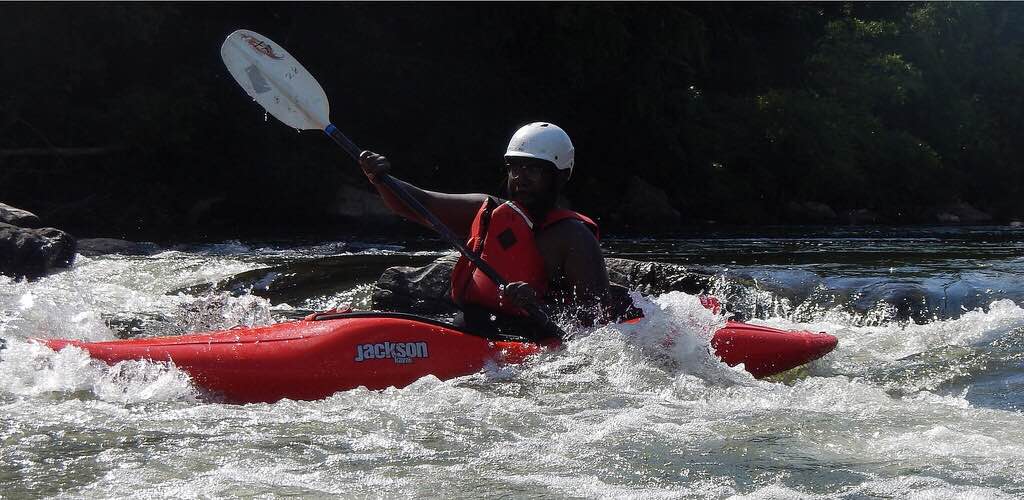On March 28, 2015, Matthew Johnson was doing what he loved to do: riding his motorcycle. He was a young, healthy 24-year-old driving to his job at the Union League of Philadelphia. Unfortunately, on this day a car would slam into him, severely injuring his lower left leg. He was taken to Hahnemann University Hospital, where surgeons tried everything they could to save his leg, but they ultimately had to amputate it below the knee. Matt spent the following two weeks inpatient at Magee before going home to adjust to a new life with a new challenge. I was Matt’s case manager when he was at Magee. To see how far he has come in such a short amount of time is, simply put, amazing. We recently chatted and I wanted to share his journey.
Ashley Loftus: Can you tell me what those first few weeks were like for you after your amputation?
Matthew Johnson: The first weeks after my amputation were interesting to say the least. It was very hard for me to adjust to needing/asking for help with simple daily tasks like walking, going up and down stairs, moving things, even showering. I had lost my independence over night. I had to learn that asking for help does not make you weak. I started really getting in touch with my emotions. I would just find myself crying out of nowhere. It was a very odd feeling for me because I never cry.
AL: What has been the biggest challenge so far for you as an amputee?
MJ: For me, the biggest challenge so far is finding a good fitting prosthetic socket and dealing with the pain in my residual limb. Because I’m so active, my residual limb is shrinking very fast and as soon as I get a new prosthetic I shrink out of it within two weeks (this is kind of a good thing). So I have pain from the limb moving too much in the socket (not a good thing).
AL: How easy or difficult has it been for you getting back to work? I have to imagine it is not easy doing your job with a prosthetic since you’re on your feet for most of the day.
MJ: I returned to work seven months after my amputation. I’m a server at the Union League of Philadelphia. Going back to work has been a huge adjustment. There have been pros and cons. On the up side, I am spending more time in my prosthetic, learning different feelings and how to use it effectively. On the down side, I sometimes tend to overdo it and push myself over my limit. Because of this, I am currently in the process of evaluating my career outlook.

Matt taking on San Francisco
AL: Last time we talked you said you had gotten involved in a lot of different activities since your amputation that you were never involved with before. Can you tell me a little bit about what you’re doing now?
MJ: Well since the amputation, I started white water kayaking, rowing, rock climbing, and I look forward to getting back into running in the coming months, once I get a running leg. I’m also working with the Athletes with Disabilities Network. They promote a better quality of life for people with physical disabilities by creating awareness and offering opportunities to get involved in athletics.
AL: It’s amazing to me that just seven months after your injury, you’re back to work and now you’re a volunteer peer mentor at Magee, so you can share your experiences with other new amputee patients. When you were inpatient at Magee, how did having a peer mentor help you adjust to having a disability?
MJ: While I was at Magee, everyone kept saying, “Oh Matt, everything is going to be great! You will be back to your life in no time.” In the back of my mind, I was like “Yeah, right. What do you know? You have both of your feet.” It wasn’t until I met my amputee peer mentor Tommy Lyon that I started to see the light at the end of the tunnel. He was awesome. He is also a below knee amputee with a similar motorcycle accident, and he is very, very active. He competes in triathlons and also in rock climbing. Seeing and talking with him really made me believe that there was life after amputation and a damn good one, too! Because of that experience I am now also a peer mentor so I can be that light for someone else.
AL: You seem to have not let your amputation prevent you from continuing on with life and going after your goals. What has motivated you to do that?
MJ: One of my biggest motivations is proving to myself that I can still do all I did before and more. I’m very hard on myself. I have the mentality that there’s nothing that I can’t do. It may take me a little bit longer to accomplish certain things, but I always find a way to get it done.





